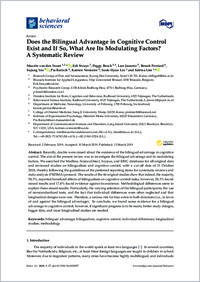Does the bilingual advantage in cognitive control exist and if so, what are its modulating factors? A systematic review
- Van den Noort, Maurits Research Group of Pain and Neuroscience, Kyung Hee University, Seoul, Korea - Brussels Institute for Applied Linguistics, Vrije Universiteit Brussel, Belgium
- Struys, Esli Brussels Institute for Applied Linguistics, Vrije Universiteit Brussel, Belgium
- Bosch, Peggy Psychiatric Research Group, LVR-Klinik Bedburg-Hau, Germany - Donders Institute for Brain, Cognition and Behaviour, Radboud University, Nijmegen, The Netherlands
- Jaswetz, Lars Behavioural Science Institute, Radboud University, Nijmegen, The Netherlands
- Perriard, Benoît Department of Medicine, Neurology, University of Fribourg, Switzerland
- Yeo, Sujung College of Oriental Medicine, Sang Ji University, Wonju, Korea
- Barisch, Pia Institute of Experimental Psychology, Heinrich Heine University, 40225 Düsseldorf, Germany
- Vermeire, Katrien Department of Communication Sciences and Disorders, Long Island University (LIU) Brooklyn, USA
- Lee, Sook-Hyun Research Group of Pain and Neuroscience, Kyung Hee University, Seoul, Korea
- Lim, Sabina Research Group of Pain and Neuroscience, Kyung Hee University, Seoul, Korea
-
13.03.2019
Published in:
- Behavioral Sciences. - 2019, vol. 9, no. 3, p. 27
English
Recently, doubts were raised about the existence of the bilingual advantage in cognitive control. The aim of the present review was to investigate the bilingual advantage and its modulating factors. We searched the Medline, ScienceDirect, Scopus, and ERIC databases for all original data and reviewed studies on bilingualism and cognitive control, with a cut-off date of 31 October 2018, thereby following the guidelines of the preferred reporting items for systematic reviews and meta-analysis (PRISMA) protocol. The results of the 46 original studies show that indeed, the majority, 54.3%, reported beneficial effects of bilingualism on cognitive control tasks; however, 28.3% found mixed results and 17.4% found evidence against its existence. Methodological differences seem to explain these mixed results: Particularly, the varying selection of the bilingual participants, the use of nonstandardized tests, and the fact that individual differences were often neglected and that longitudinal designs were rare. Therefore, a serious risk for bias exists in both directions (i.e., in favor of and against the bilingual advantage). To conclude, we found some evidence for a bilingual advantage in cognitive control; however, if significant progress is to be made, better study designs, bigger data, and more longitudinal studies are needed.
- Faculty
- Faculté des sciences et de médecine
- Department
- Département de Médecine
- Language
-
- English
- Classification
- Biological sciences
- License
-
License undefined
- Identifiers
-
- RERO DOC 324690
- DOI 10.3390/bs9030027
- Persistent URL
- https://folia.unifr.ch/unifr/documents/307741
Statistics
Document views: 208
File downloads:
- pdf: 244
